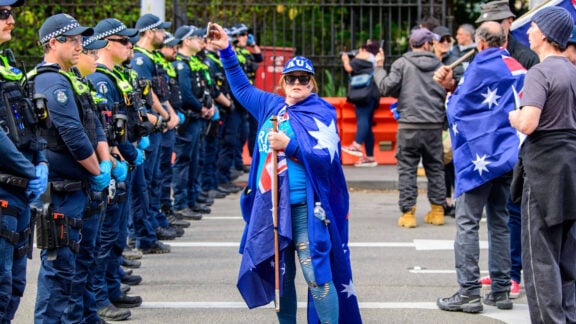If there was still any doubt that the government’s new citizenship test – and overall approach to citizenship and migration – is going to create more problems than it is going to solve, then this week should have dispersed them. Because this week, in a turn of events that makes the word ‘ironic’ seem like a great understatement, saw the resignation of two prominent Greens senators over dual citizenship and the rise of the man dealing with immigration and citizenship to ‘super ministerial’ status.
As prospective citizens get ready to study hard to pass their language and ‘Australian values embracement’ test, Scott Ludlam and Larissa Waters gave up their seats in the senate, after discovering that they were also citizens of New Zealand and Canada, respectively, which makes them ineligible to hold poliical office according to the Australian Constitution. The question on everyone’s lips was: “how on earth is it possible for them to not have known that they are dual citizens and that this prevents them from being elected?” Is this stupidity? Ignorance? Or plain dishonesty?
In most probability, it is none of these things. It is due more to the complicated nature of our citizenship legislation and it’s lack of evolution throughout these past decades.
One can imagine every sitting MP in both houses doing the same personal – and long overdue – background check and, predictably, the media was flooded with lists of politicians born overseas, from Penny Wong (born in Malaysia) and Maria Vamvakinou (born in Lefkada, Greece) to former Health Minister Sussan Ley (born in Nigeria) and a certain Tony Abbott (born in the UK). Surely, most of them, if not all, had made provisions and denounced their dual citizenship, before running for office, but still the panic and speculation was in the air.
Much to the delight of the person who has turned Australian citizenship into a kind of carrot-stick combination, a valued prize and leverage, something that divides Australians into first and second class citizens. And if the week was not already playing out in favour of the Minister of Immigration and Border Protection, Peter Dutton was appointed ‘super minister’ of Home Affairs.
The term itself is an understatement of Orwellian proportions. Hearing about a Ministry of Home Affairs, one would be forgiven to think that this would have to deal with all that involves everything that affects life in Australia: people’s welfare and prosperity, the real economy, infrastracture, relationships between different groups within the population – but no; in reality, ‘Home Affairs’ stands for ‘Law and Order’, for policing.
“Importantly, ASIO, the AFP and Australian Border Force will all report directly to the Home Affairs minister”, Malcolm Turnbull explained, while announcing the news. “This will ensure that these three important agencies have direct reporting into the cabinet.”
The new portfolio also incorporates the Australian Criminal Intelligence Commission, the Australian Transaction Reports and Analysis Centre (Austrac) and the Office of Transport Security. In other words, the new status of Peter Dutton is not so much that of a super-minister and more that of a super-cop, someone set to protect the citizens of Australia from all internal and external threat, from gangsters, bikies and murderers to jihadi terrorists. This in itself raises a lot of questions on the implications of all this power being given to one minister, and the danger of Australia becoming a police state, but it might be palatable, if Peter Dutton had given up the immigration portfolio. But no, the new ministry combines all law enforcement agencies, alongside border protection and immigration. Which only further confirms what is evident with every policy announcement. That this government – and this minister in particular – see immigration as a threat, something that Australia needs protection from. It is a viewpoint that puts Australia in a very ominous trajectory, turning it backwards.
At this stage, all argument for the benefits of immigration are falling to deaf ears. There’s no point stating how this country was built on the labour of immigrants working in the factories, creating wealth. There’s no point in discussing how the multicultural policy of the past 40 years allowed Australia to become one of the world’s leading economies, making it wealthier in resources, funds and human capital. These arguments are losing to a rhetoric of fear and xenophobia (and the resistance of White Australia) which cast a shadow over immigration policies.
There is no point in trying to educate lawmakers and ministers on the notion that border protection is not the best policy for economic growth, that many economists argue that open border policy might be the best option, with vast economic benefits to be gained from the free movement of people: in a 2011 paper titled ‘Economics and Emigration: Trillion-Dollar Bills on the Sidewalk?’ economist Michael Clemens argued that loosening immigration restrictions could double the global GDP average.
“Divide the world into a ‘rich’ region, where one billion people earn $30,000 per year, and a ‘poor’ region, where six billion earn $5,000 per year”, Clemens explains.
“Suppose emigrants from the poor region have lower productivity, so each gains just 60 per cent of the simple earnings gap upon emigrating – that is, $15,000 per year. This marginal gain shrinks as emigration proceeds, so suppose that the average gain is just $7,500 per year. If half the population of the poor region emigrates, migrants would gain $23 trillion – which is 38 per cent of global GDP.”
This policy would require the combined skills of a Super-Treasurer, a Super-Foreign Minister and a Super-Humanitarian. But all we’ve got is a Super-Cop, afraid of people carrying two passports. We need to prove him wrong.









